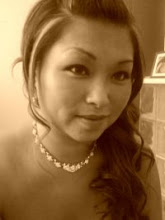The government sets the guidelines, which the teachers of the Kindergarten follow efficiently. Before I started the trainee position, the children have been taught about Ho Chi Minh; his love for Vietnam, passion for making Vietnam an independent country etc. The teachers teach the children to be proud of being Vietnamese. When they have finished their morning exercise, the teachers shout "Vietnam!!!" the children yells "co len!!!!" - which means "Vietnam is the best!".
Vietnamese New Year (Tet) is a national feast, and they also celebrate it in the Kindergarten. The children have been taught about Tet, were they welcome the new star sign "The Ox". Furthermore, they give lucky-money (in little red envelopes) to others, as a symbol of good health and prosperity for the new coming year.
At the end, they went to the temple, were they also burnt "money" (fake money notes), as a symbol of giving money to their relatives who has passed, their ancestors, prophets and Buddha. Visiting temples doesn't necessarily mean that you’re a Buddhist, as it has become a national custom to do during Tet.
I have mentioned in the earlier sections/chapters that the parents have a high influence on the teachings in the Kindergarten - not only the teachings, but also with the child upbringing. The children must obey the teachers as if they were the children’s parents. There are no room for individuals; the child must follow the rest of the group. The child represent their parents, the parents represent their child. One “weak link” could break the entire family name - so they're are taught by the teachers, not to display emotions in public. This has come to my understanding of why the teachers hardly comforts a child, when a child is crying - they don't want to make the child soft.
Children are often very emotional, and aren't always in control of their emotions - it's only natural. Maintaining the family name, is a big burden to carry on ones shoulder as a child, and they constantly need guidance from the teachers. Upbringing the cchildren is also one of the major part of the teacher's task in the Kindergarten.
A Vietnamese saying says "you're a child, as long as your parents live, regardless of your age". So with that understanding, it means that you have to show respect for elders - in this case, the teachers are like the children's mother. The teacher teaches the children, how to respect elders; love for their parents, teach them about empathy - how to treat others, which is bound to strengthen their social skills.
They have a lot of poetry reading which the children have to learn by heart. Most of the poetry is about one’s love for their parents, especially for their mother, love for their country, and love for the teachers....because the teachers are making an effort of upbringing the child, the child have to give again by showing appreciation towards the teachers.
When the children are being collected, it's highly important, that the children are dressed nicely (or have changed their clothes, if they have been sweating during playing) and that their hair is neat. If the parents turn up in the class, and their child looks messy, it also means (according to the parents) the teacher has failed to look after their child – that the teachers have been neglected their child. The same principles, if a child have been bruised during playing in the playground.
The consequences could be, that it will affect the teacher’s salary, as the parents pays a certain amount of their salary.
At our last workshop, the topic was Motor Skills. We were trying to make the teachers aware of, that children need to use their body more actively, so they could be more aware of their movements, so it could be more controlled. When the children run, the teachers scream “stop running” - as they will only trip and fall. In most cases, the teachers are right - but it's also because the child has no control over his/her movement.
We have encouraged the teachers to make more activities that involve movements and running. The teachers agree with us to a certain extent; however the obstacles are the parents. The parents will not approve the Kindergarten as a qualified place, if their child returns home with bruises or scratches on the body. So for that reason, the teachers are prevented in developing the children in certain areas - the parents are often focused on teachings, like school children, so they're well prepared when they start schooling.
So it's obvious, that the daily structure is teachings and lessons. When they play, it's controlled play, were the children are "learning by doing". If they have a certain topic, the children create things, draw things, and play with things that are related to the topic. There’s no time for free playing, when the government's guidelines and the parents are focused on teaching the children.














